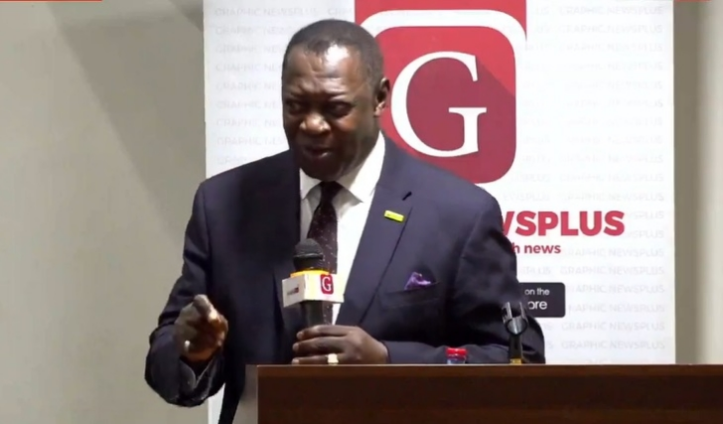The rise of hypertension and diabetes in Ghana is very worrying, as it is posing an increased danger to the populace, Professor Agyeman Badu Akosa, a renowned cellular pathologist and lifestyle wellness consultant has observed.
For instance, he says it is very worrying the rate at which many people have resorted to the intake of high-calorie energy drinks.
Prof. Akosa said this at the Graphic National Development Series (GNDS) for 2024 held in Accra on Tuesday {May 28, 2024}.
Citing trotro and long haul drivers as an example, he said what is happening in Ghana in that area, "If we don’t put a stop to it, these things are going to blow up and it is high-calorie energy drinks."
"These energy drinks have seven calories, a highly dense calorific value, no nutritional value, no nutritional value at all. It is dense sugar and coffee. And the people who drink it are the trotro drivers and the long haul drivers. It is a standard thing, every morning they put a pack of six in the car.
"You are putting a lot of calories into your system you will get diabetes easily. We are talking about 10 per cent prevalence of diabetes. But among those who are diabetics, who are just waiting for the next visit they will told that your fasting blood sugar is 5.7 or 6, then you know that you have fallen into the trap. So the pre-diabetics is two times the proportion that we have already."
"So we are sitting down and allowing these dreadful diseases, and I must say dreadful diseases, hypertension is called the silent killer, and if you take two adult men above the age of 50, one is hypertensive," he added.
Referencing research data from various studies undertaken from 1960 to 2024, Prof Akosa said in Ghana, diabetes was 0.2 per cent in 1960 per a study done by Prof Silas Duodu.
In 2006 Prof Albert George Amoah did a study and it had come to 6.4 percent. They did an Accra women study and it had gone to 8.6.
And the last population analysis that was done, it was on Accra civil servants and it was 9.1 per cent, he said.
"So we have gone from 0.2 per cent to now let me say, 10 per cent, [which is] 50 more increase and who is talking about it?
The maiden edition of the GNDS was held in Kumasi in April last year on the theme: "Transforming Ghana's Agriculture using home-grown solutions for food security." It is a forum that delves into development issues with a focus on shaping ideas, building consensus on strategic issues and ultimately influencing policy.
Speaking on the topic, “Putting health in the reach of the ordinary Ghanaian - the how,” Prof. Abuosi said although NHIS was a critical intervention to help attain universal health coverage, a look at the structure and reviewing it would go a long way to sustain it.
Latest Stories
-
Paris 2024: Opening ceremony showcases grandiose celebration of French culture and diversity
3 hours -
How decline of Indian vultures led to 500,000 human deaths
4 hours -
Paris 2024: Ghana rocks ‘fabulous fugu’ at olympics opening ceremony
4 hours -
Trust Hospital faces financial strain with rising debt levels – Auditor-General’s report
5 hours -
Electrochem lease: Allocate portions of land to Songor people – Resident demand
5 hours -
82 widows receive financial aid from Chayil Foundation
5 hours -
The silent struggles: Female journalists grapple with Ghana’s high cost of living
5 hours -
BoG yet to make any payment to Service Ghana Auto Group
5 hours -
‘Crushed Young’: The Multimedia Group, JL Properties surprise accident victim’s family with fully-furnished apartment
6 hours -
Asante Kotoko needs structure that would outlive any administration – Opoku Nti
6 hours -
JoyNews exposé on Customs officials demanding bribes airs on July 29
7 hours -
JoyNews Impact Maker Awardee ships first consignment of honey from Kwahu Afram Plains
8 hours -
Joint committee under fire over report on salt mining lease granted Electrochem
8 hours -
Life Lounge with Edem Knight-Tay: Don’t be beaten the third time
8 hours -
Pro-NPP group launched to help ‘Break the 8’
8 hours

